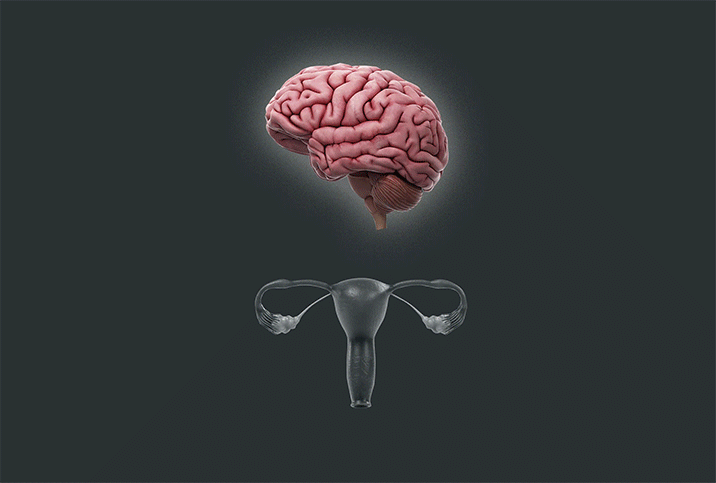Mind Over Menopause: How CBT Can Help Manage Symptoms

When we think about menopause, we often focus on the physical symptoms: the discomfort of hot flashes, vaginal dryness, night sweats and more. But for many women experiencing the menopausal transition, mental health struggles are prevalent, as well.
"One in three women are menopausal or perimenopausal, so it's important that we all develop our understanding of menopause, including the physical and mental symptoms," said Samantha Wild, M.R.C.G.P., women's health clinical lead and primary care physician at Bupa Health Clinics, an international company headquartered in London.
"With the number of changes that happen to your body during menopause, it's completely understandable if you don't feel like your usual self; you may feel moodier, isolated or anxious," Wild said. "However, just because the changes going on in your body are natural doesn't mean that you shouldn't seek support if you're struggling."
The good news is that many different treatments can help, and cognitive behavioral therapy (CBT) is particularly promising.
Cognitive behavioral therapy is a short-term therapy, typically four to six sessions, that can be delivered in groups, one to one, online or by telephone.
"CBT is a type of talking therapy that aims to change negative thoughts and beliefs that may affect the way that you feel and behave," Wild explained. "By working together with a professional therapist, you'll learn specific skills that will help you to cope with and break the cycle of any negative thoughts or behaviors that you feel in everyday life."
How CBT can help with menopausal symptoms
CBT can help with the anxiety and depression that sometimes affect women during the menopausal transition and in the postmenopause stage, according to a 2021 study published in Climacteric.
"Several clinical trials have investigated the use and benefit of CBT for anxiety, hot flushes, night sweats, depressed mood and sleep problems," said Fionnuala Barton, M.B.B.S., a general practitioner and women's health doctor in London. "These have shown that CBT can be beneficial for treating these symptoms in the short and longer term."
This can be hugely beneficial in making menopausal symptoms more manageable for women.
"As hot flushes and night sweats can be triggered by stress, teaching menopausal women coping methods…can provide significant improvements to their quality of life," Wild said.
"Studies have shown it to be of the same benefit in reducing depression, anxiety and behavioral problems as antidepressant medication," Barton added.
Who are the best candidates for CBT?
Research has consistently demonstrated CBT to be beneficial for menopausal symptoms in a variety of women. Cognitive behavioral therapy is effective regardless of age, body size, mental health status or stage of menopause, according to a 2014 study published in Menopause.
CBT is especially helpful for certain individuals.
"From a practical perspective, women who are unable to use HRT [hormone replacement therapy] for safety reasons are very well suited to a CBT approach," Barton explained. "Women who have preexisting anxiety, insomnia or mood disorders may also find this particular approach helpful, as strategies employed can offer additional benefits to mental and physical health beyond that of menopause symptoms."
While the therapy is effective, CBT requires a lot of effort.
"It involves implementing multiple behavior changes and tracking results," explained Nanette Santoro M.D., professor and E. Stewart Taylor chair of OB-GYN at the University of Colorado School of Medicine. "This is especially true for insomnia because it involves rigid control of bedtime hours, lights out at a consistent time every night, and avoiding getting up and wandering around the house after waking up in the middle of the night."
This means you need to be in the right mindset to start the therapy.
"CBT works best for those who are ready and willing to work with their therapist to actively change their thoughts and behavior," Wild said. "As CBT is something that takes time to work, it's important that you feel ready and committed to practice exercises or techniques that your therapist assigns you, both in your sessions together and in your own time."
Other options for treating menopause
Regardless of whether CBT is right for you, several other tools can be beneficial.
"A lot happens to your body during menopause, so it's useful to go back to basics to make sure you're taking care of yourself both mentally and physically," Wild explained.
"Eating a balanced diet rich with calcium and vitamin D, exercising regularly, giving up smoking, reducing how much caffeine and alcohol you drink, as well as getting good quality sleep and taking time to relax, can all help to manage menopausal symptoms," she added.
Reaching out to others is also important.
"Alongside taking care of your physical symptoms, be sure to talk about how you are feeling with your friends and family," Wild advised. "If your symptoms are affecting your performance at work, it can be useful to speak to your co-workers and manager, too, as this may start a conversation about tweaking your work arrangements to help you cope better."


















